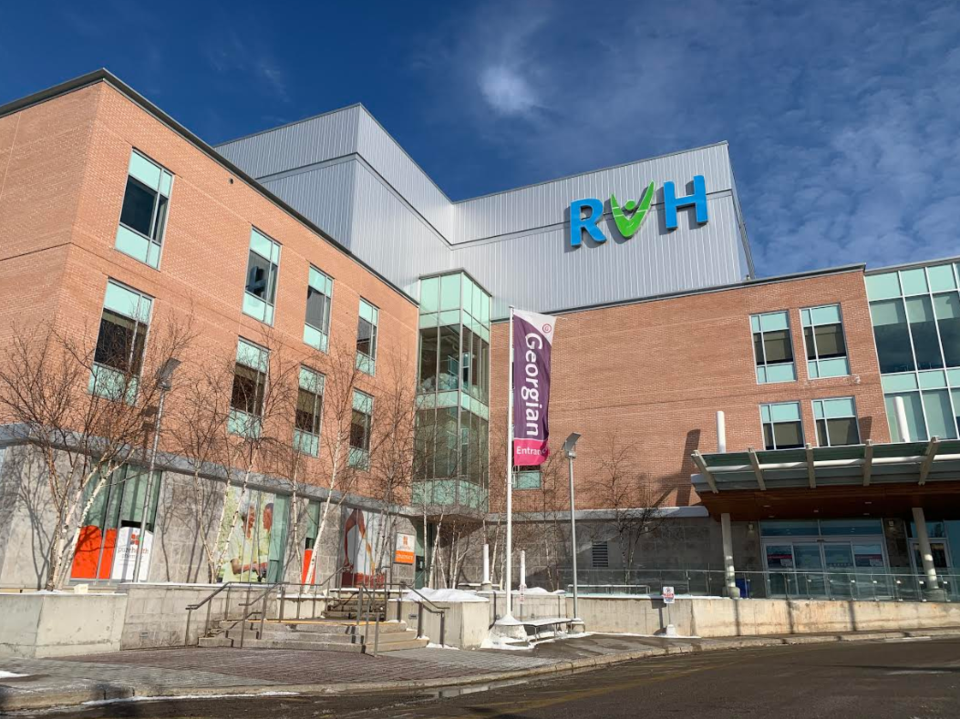A field hospital constructed in the parking lot of Barrie’s Royal Victoria Regional Health Centre (RVH) — designed as a release valve for any pressure imposed on area hospitals as the pandemic persists — is expected to be available next month.
“We will begin phasing in 70 beds in the regional Pandemic Response Unit in November,” said RVH president and CEO Janice Skot.
The 70-bed, four-season facility was built earlier this year to be available for North Simcoe Muskoka hospitals if they become overwhelmed during the pandemic. Plans are currently underway to staff it.
If any increase in demand for medical services gets to the point that the hospitals are overwhelmed, the field hospital is intended to provide additional hospital services identical to those currently offered at the permanent hospitals.
Patients hospitalized for COVID-19 will receive care in the permanent hospitals while the temporary facility is intended to serve regular medical patents with anticipated stays of three to five days.
“The PRU (regional pandemic response unit) is not a COVID unit,” said Dana Naylor, RVH’s chief of patient care. “The people in the PRU receive the same level of quality care that they would in any other hospital. You’re just receiving it in a different location.
“The whole aim is to care for patients from around the region, while keeping our hospitals at safe occupancy levels.”
Work is currently underway to staff the field hospital with physicians, registered and registered practical nurses, allied professionals and patient care assistants similar to the health-care teams found inside the hospital.
The number of cases of the coronavirus has increased in Simcoe-Muskoka in recent weeks, although hospitals in Simcoe-Muskoka are not overwhelmed, operating at an average capacity of 84.36 per cent and reporting a total of five COVID-19-related hospitalizations earlier this week.
Simcoe-Muskoka medical officer of health Dr. Charles Gardner says if the current trajectory of cases increases, the number of cases locally could double within two months, putting pressure on all services.
Naylor says the construction of the field hospital was informed by similar projects that had been developed by Joseph Brant Hospital in Burlington, which has 93 beds and cost in excess of $2 million to build and Trillium Health Partners - Mississauga Hospital with 80 beds.
The Barrie facility, which is connected to the main building through an above-ground tunnel, is insulated and equipped with heating and cooling for four-season use. It’s considered a regional asset designed to serve the catchment areas covered by the hospitals in Barrie, Collingwood, Midland, Muskoka, Orillia and Alliston.
Project planning began with a steering committee and included Waypoint Mental Health Centre in Penetanguishene as well as the Simcoe Muskoka District Health Unit, the County of Simcoe and City of Barrie.
“This allowed us to work in a different way together for us to build something together,” said Naylor.
The collaboration included input in design and resulted in weekly updates to the partners. And It was built at the direction of Ontario Health, which will provide direction on when it opens as well as patient flow.
The structure contains three interprofessional or nursing stations. A second, smaller attached structure contains 10 washrooms and a shower.
“We’re just polishing the operational plan and then we’re working internally for recruitment and working on finalizing the budget,” Naylor said.
Naylor was unable to provide the estimated cost of the facility or the staffing complement anticipated, although she said it will follow the same staff-to-bed ratio that is used for the main hospital.
“How long the structure will be in place will be dependent on how long we would need a plan in place to respond to the pandemic,” she said.
The provincial government also announced this week that Ontario’s permanent hospitals will be receiving additional beds to help address additional demands imposed by the health pandemic.
Skot says RVH is working with the province to open new bed capacity in Barrie to help respond to the second wave of the pandemic and “avoid hallway medicine” and she hopes to soon receive funding confirmation.
